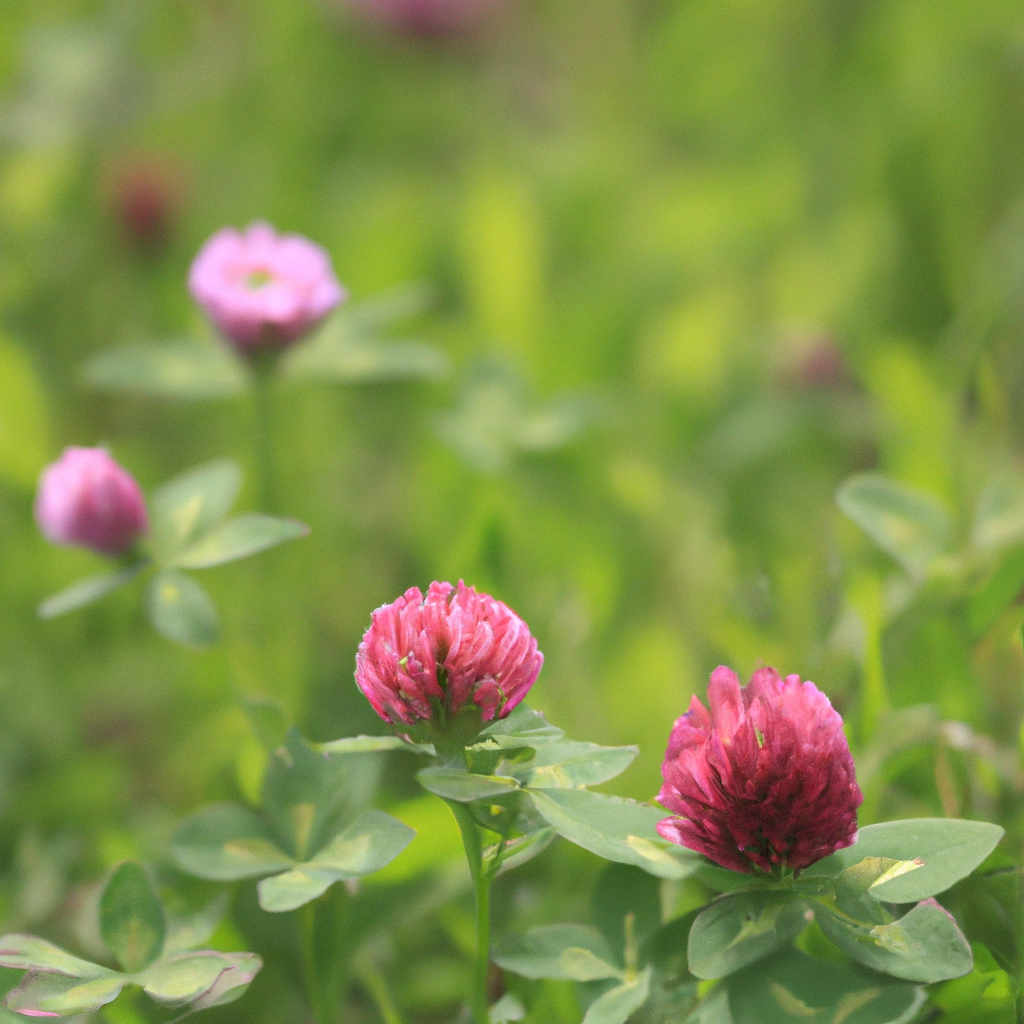Biological Name:
Trifolium pratense (Red-Clover)
Natural Habitat:
Red-Clover is a clover species with pink or red flowers. It is a popular cover crop and is often used in pastures for livestock grazing.
Description:
Red-Clover is a low-growing perennial weed with trifoliate leaves and pink or red flowers. It is commonly found in fields pastures and other areas with moist fertile soil.
Frequently Asked Questions (FAQs)
Q: Does red clover increase estrogen?
A: Because of that, they can affect the endocrine (hormonal) pathway and increase estradiol (one of the forms of oestrogen). Multiple studies have shown that red clover supplementation can increase estradiol levels in menopausal women4.
Source
Q: When should you not take red clover?
A: Red clover extracts have been used in clinical studies for as long as 3 years with apparent safety. Women should not take red clover supplements during pregnancy or while breastfeeding.
Source
Q: What are the benefits of taking red clover?
A: Red clover is an herb used in traditional medicine to treat a wide range of health issues, such as hot flashes, osteoporosis, arthritis, and skin and hair disorders. Some research has found taking 40–80 mg of red clover daily may help reduce severe menopausal hot flashes.
Source
Q: Does red clover cause hair growth?
A: Red clover has also become a popular ingredient in shampoos and hair treatments to support hair health. In fact, research done by Obstetrics and Gynecology International reveals that red clover extract may even increase hair growth for those experiencing hair loss due to alopecia.
Source
Q: Can I take red clover with other supplements?
A: Red clover has no known severe interactions with other drugs. Red clover has no known serious interactions with other drugs.
Source
Q: Does red clover help with mood swings?
A: According to Kupperman index, the subscales of ‘depression’ and ‘nervousness’ revealed a significant improvement in the red clover group compared to the placebo group (both, P = 0.05).
Source
Q: Is red clover good for high blood pressure?
A: Red Clovers may be able to ease hypertension. The flower contains anti-inflammatory properties, and so when consumed, blood pressure is reduced, and tension in the arteries and blood vessels is eased. This can, in turn, help to prevent heart conditions and other cardiovascular complications.
Source
Q: What does red clover do for the body?
A: Red clover is an herb used in traditional medicine to treat a wide range of health issues, such as hot flashes, osteoporosis, arthritis, and skin and hair disorders. Some research has found taking 40–80 mg of red clover daily may help reduce severe menopausal hot flashes.
Source
Q: Is red clover good for kidneys?
A: The benefits of red clover … It’s another great diuretic, meaning it helps remove extra fluids (water weight) and cleanse the kidneys. It’s also great for removing mucus from the respiratory system, reducing inflammation, and cleansing the blood.
Source
Q: Is red clover good for arthritis?
A: Red clover is typically used to treat respiratory issues such as asthma or bronchitis, skin disorders like eczema and psoriasis, inflammatory conditions like arthritis, and women’s health problems including menstrual symptoms.
Source
Q: How long does red clover take to work?
A: A meta-analysis of studies in postmenopausal women taking red clover for 4-12 months improved their heart health. This was due to a significant increase in the ‘good’ cholesterol HDL and a decrease in total and ‘bad’ cholesterol (LDL) levels.
Source
Q: Does red clover have side effects?
A: No serious side effects have been reported in people taking red clover for up to 1 year. General side effects may include headache, nausea, and rash. However, animals that graze on large amounts of red clover have become infertile.
Source
Q: Is red clover a detox?
A: Red Clover supports a healthy detoxification process, helping to remove metabolic waste from the body, by assisting in the purification of the blood and lymph. Red Clover, nettles and yellow dock can be blended and made into a tea for skin conditions.
Source
Q: Who should take red clover?
A: Historically, red clover was used for asthma, whooping cough, cancer, and gout. Today, extracts from red clover are most often promoted for menopause symptoms, high cholesterol levels, or osteoporosis.
Source
Q: Can you take red clover daily?
A: It is possibly safe to take red clover in doses that provide up to 80 mg of isoflavones daily for up to 2 years. It’s usually well-tolerated, but might cause muscle aches, nausea, and vaginal bleeding (spotting) in some people.
Source
Q: Does red clover grow hair?
A: Red clover has also become a popular ingredient in shampoos and hair treatments to support hair health. In fact, research done by Obstetrics and Gynecology International reveals that red clover extract may even increase hair growth for those experiencing hair loss due to alopecia.
Source
Q: Does red clover interact with any medications?
A: Drug interactions Many natural herbs can interfere with the effectiveness of medications. In particular, red clover may interact with oral contraceptives, methotrexate, hormone replacement therapy medications, tamoxifen, blood thinners like aspirin or Plavix, among others ( 31 , 36 ).
Source
Q: Is red clover invasive?
A: Trifolium pratense (Red Clover) is listed in the Invasive Plant Atlas of the United States. According to the U.S Forest Service, Invasive species have contributed to the decline of 42% of U.S. endangered and threatened species, and 18% of U.S. endangered or threatened species.
Source
Q: Will red clover choke out weeds?
A: Clover’s dense roots and rapid growth will naturally smother weeds, so you won’t have to apply harsh pre-emergent or post-emergent herbicides. In fact, it’s important to avoid broadleaf herbicides on clover to prevent plant damage and death.
Source
Q: Will red clover take over my lawn?
A: Clover thrives in cool, moist areas, grows in full sun to partial shade, and tolerates heat and drought. It’s also a legume, so it makes its own nitrogen fertilizer. Put simply, clover can be quite a powerful lawn invader.
Source
Q: Does red clover need to be mowed?
A: In middle to late August, mow the red clover. Mowing will stimulate regrowth at the crowns. It will also remove weeds that have grown after harvest. Cutting the red clover for weed management should be timed when the weeds have not produced viable seeds.
Source
Q: Does clover spread if you mow?
A: Adjust your mowing height Clover prefers to grow in areas where the grass is less than 3 inches high. Set your mower to 3 inches or higher and let your grass grow out a bit to deter clover from growing and spreading. If you mow it at a higher setting, your grass will have a better chance of outcompeting the clover.
Source
Q: Should I let clover take over my lawn?
A: Clover Kills Other Weeds Growing clover does not allow room for typical lawn weeds to thrive, meaning the lawns you mow could be weed-free and beautiful! Those are just a few ways that clover can benefit lawn grass. Not only is the use of clover organic, inexpensive, and easy, it’s also very effective.
Source

